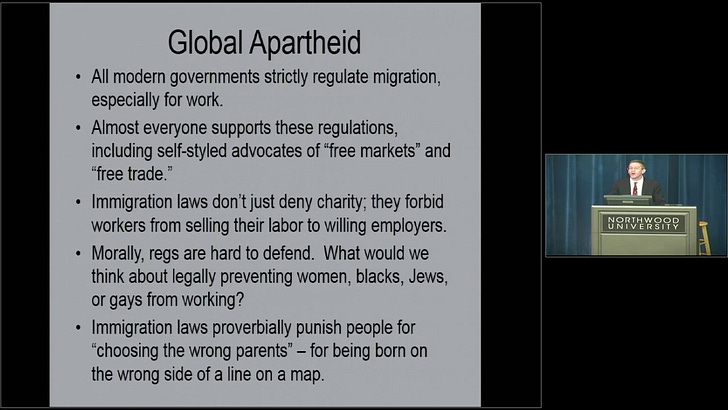
If you missed the Caplan-Jones debate, you can watch a slick version here.
The best part: We each had five minutes to “grill” each other. I learned a lot during those minutes. Main thoughts:
1. Garett neatly boils down research on migration-adjusted measures of “deep history.” I’ll blog the papers later, but one key finding is that countries now inhabited by the descendants of historically advanced civilizations do much better than countries now inhabited by descendants of historically backwards civilizations. How do they measure “advanced” and “backward”? Several ways, especially state history (S), dawn of agriculture (A), and technology in 1500 AD (T). Garett, going for a double entendre, calls this the SAT score.
2. Garett was coy about the immigration policies that he does favor. But his talk suggested – and grilling confirmed – that he has no objection to open borders with countries with high SAT scores – including China and India! That’s billions of people. Thus, while opponents of immigration might like Garett’s tone, he offers no argument against radically more open immigration than currently exists. Indeed, it’s fair to say that Garett is about halfway between the mainstream American view and me.
3. Garett opened his statement by claiming that economists urge us to focus on the very long-run – the consequences of policies a century or more in the future. He’s mistaken. The essence of the economic approach to intertemporal choice is not focusing on the distant future, but relying on a consistent social discount rate. Economists tend to favor relatively low discount rates or 2-3%. But that still implies that we should largely ignore consequences a century or more in the future. With a 2.5% discount rate, $1 in 2125 is only worth $.08 today.
Garett could reply that we should use a much lower social discount rate – say 1%. But this has all sorts of bizarre implications. It implies, for example, that governments are investing too little in almost everything. Government should dramatically curtail our current consumption to enrich our great-grandchildren. At minimum, governments should heavily raise taxes, and use the money to invest in sovereign wealth funds. Earning more than 1% a year is easy. As far as I know, Garett has never advocated such policies.
Rhetorically, Garett did a good job of selling the importance of the future by reminding audience members to think of their “children and grandchildren.” But he didn’t mention that people who care about their descendants needn’t rely on government policy. Anyone who wants to help their children and grandchildren can simply spend less money, invest the savings, then provide a bigger inheritance. If you aren’t already doing this, you don’t actually care very much how your descendants will be doing a century hence. Nor should you – there’s every reason to think they’ll be a lot richer than you are.
4. Why is there such a chasm between Garett’s tone and his substance? I’m
frankly baffled. In person, Garett is one of the nicest people I know, so I’d expect him to at least stand up for the billions of immigrants that – in his own view – the First World brutally excludes for no good reason. But he chooses to leave them hanging.
What’s my least-bad guess about Garett’s thinking? Well, it’s no secret that he’s a meta-ethical moral relativist. Speculation: As a result of this position, Garett is (a) uncomfortable making moral judgments, (b) disinclined to make his own moral judgments internally consistent, and (c) reluctant to condemn positions that intuitively seem deeply evil. Logically speaking, of course, a meta-ethical moral relativist could be an enthusiastic moralist. But psychologically speaking, moralizing weighs on the conscience of a relativist.
P.S. Garett’s Hive Mind is now in stores. It’s a wonderful book in every way, Garett at his very best.
The post appeared first on Econlib.














